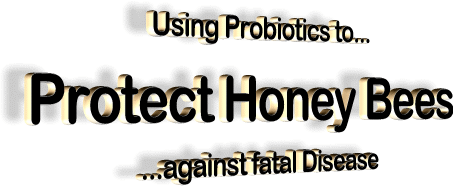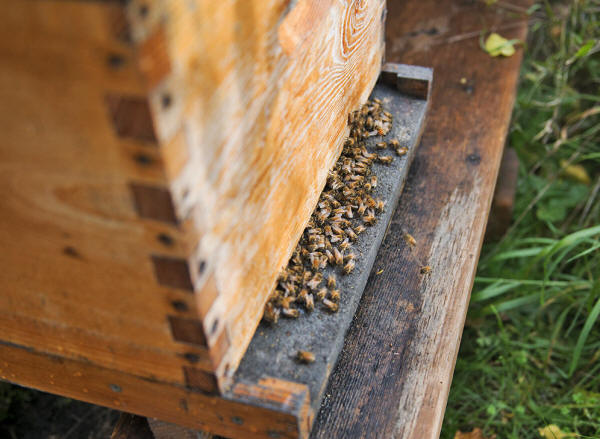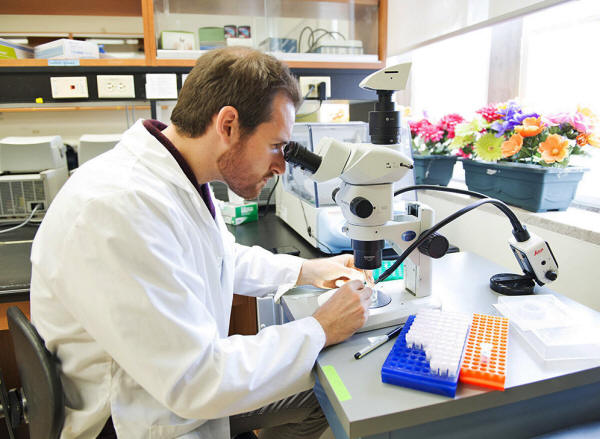|

by University of Western Ontario
October 30,
2019
from
PHYS Website

Honey bees at experimental Apiary
at
Western University in London, Ontario.
Credit:
Western University
Probiotics, beneficial
microorganisms best known for promoting gut health in humans, are
now being used by Western University and Lawson Health
Research Institute scientists to save honey bee colonies from
collapse.
A new study published in
the Nature journal ISME J demonstrates how probiotics could
potentially stave off a common bacterial hive infestation called
American Foulbrood.
"Probiotics aren't
just for humans," said Gregor Reid, Ph.D., Professor at
Western's Schulich School of Medicine & Dentistry and Endowed
Chair in Human Microbiome and Probiotics at Lawson.
"Our idea was that if
you could use beneficial microbes to stimulate the immune
response or attack the pathogens that are infecting the hives,
then maybe we can help save the bees."
Honey bees are an
important part of the cultural and economic landscape in Canada and
globally because of their role in food production both through
pollination of crops and through honey production.
However, the world's bee
population
is being threatened by the spread
of viruses and bacteria that infect the hives.
The team's previous work in a fruit-fly model suggested that the
wide-use of pesticides reduces bees' immunity and their ability to
fight back against these harmful pathogens.
With that in mind, a group of researchers at Western and Lawson
combined their expertise in probiotics and bee biology to supplement
honey bee food with probiotics, in the form a BioPatty (nutrient
patty), in their experimental apiaries.
The aim was to see what
effect probiotics would have on honey bee health.

PhD Candidate Brendan Daisley
from
Western University's
Schulich School of Medicine & Dentistry
examines a bee under the microscope.
Credit:
Western University
During their experiment, the hives became inadvertently infected
with American Foulbrood, a common hive disease produced by the
bacteria P. larvae, which would typically cause the bees to die.
"Bee colonies are
really interesting little microcosms of biology.
There are lots of
individuals bees, but they are all genetically related and they
are living in a close confined space," said Graham Thompson,
Ph.D., Associate Professor in the Faculty of Science at Western
who studies the biology and social behavior of bees.
"They are all very
susceptible to contagious disease and they are demographically
disposed to outbreaks."
What they found was that
in the bee hives treated with probiotics, the pathogen load was
reduced by 99 per cent, and the survival-rate of the bees
increased significantly.
When they examined the
bees in the lab, they also found that there was increased immunity
against the bacteria that causes American Foulbrood in the bees
treated with the probiotics.
"The results from our
study demonstrated that probiotic supplementation could increase
the expression of a gene called Defensin-1 - a key antimicrobial
peptide shown to play a pivotal role in honey bee defense
against P. larvae infection," said Schulich Medicine & Dentistry
Ph.D. Candidate Brendan Daisley who was the lead author on the
paper.
"Alongside these
findings, we also observed an increase in pathogen clearance and
overall survival of honey bee larvae."
Another interesting
observation was that the bees that were given the BioPatty, but
no probiotic, were the most susceptible, even more so
than bees that were given nothing at all.
The research team says
this suggests there may be a negative outcome to the common practice
of supplementing bee colonies with extra food as it could
stimulate the pathogens to proliferate.
"Long term we hope to
add a viable, practical and available treatment alternative to
chemicals and antibiotics that beekeepers can readily adopt into
their bee-keeping habits to help prevent colony collapse," said
Thompson.
Additional information
-
https://www.sciencedaily.com/releases/2019/10/191030132715.htm
-
https://nccih.nih.gov/health/probiotics/introduction.htm
-
https://beeaware.org.au/archive-pest/american-foulbrood/#ad-image-0
| 


